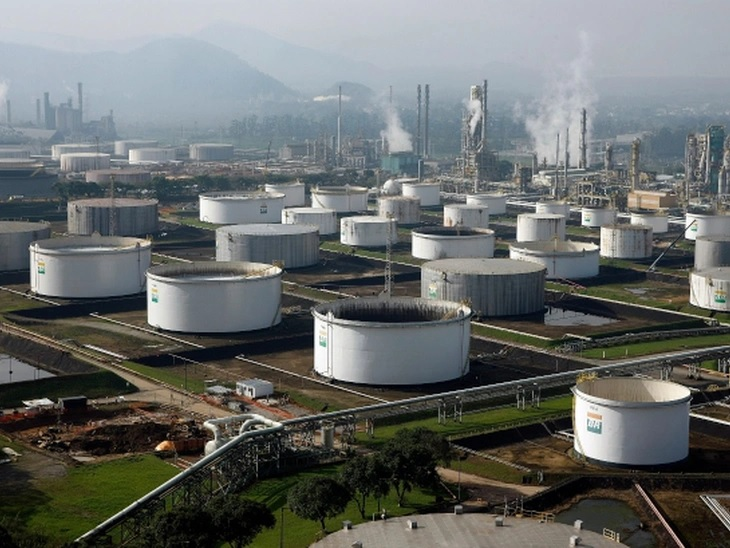
 Environment
Environment
A new plant will be installed at RPBC, in Cubatão (SP). Fuels will have the potential to reduce greenhouse gas emissions by up to 90%
T&B Petroleum/Petrobras Agency
Petrobras will set up, in Cubatão (SP), the first unit in the country entirely dedicated to the production of 100% renewable diesel and aviation biokerosene (BioQAV), a type of sustainable aviation fuel. The project is part of the company's BioRefining Program, one of the highlights of its Strategic Plan for the period 2023-2027, which will receive investments of US$ 600 million for the development of a new generation of sustainable fuels, with a lower carbon footprint.
Renewable diesel and BioQAV have the potential to reduce greenhouse gas emissions by between 55% and 90% compared to petroleum-derived fuels, as they come from renewable raw materials (such as vegetable oil and animal fats).
The new plant will be installed at the Presidente Bernardes Refinery (RPBC), in Cubatão (SP), with capacity to produce 6 thousand barrels per day (bpd) of BioQAV and 6 thousand bpd of 100% renewable diesel from the processing of up to 790 thousand tons/year of renewable raw material.
RPBC was chosen to house the new unit due to its proximity to the Southeast region market and greater integration with the national refining park. “The new plant is one of the highlights of our BioRefining Program, crucial for us to deliver products with lower greenhouse gas emissions, in line with society's demands and with a changing world. In addition to the dedicated biorefining plant, we are going to invest in the co-processing of diesel with renewable content in other refineries and in the production of other derivatives with vegetable raw material”, said the Director of Refining and Natural Gas at Petrobras, Rodrigo Costa.
There will be an expansion of co-processing for the production of Diesel R - with renewable content - at the Presidente Getúlio Vargas Refinery (REPAR), in Paraná, and the start of co-processing for the production of Diesel R at the Presidente Bernardes refineries, in Cubatão (RPBC) and the Paulínia Refinery (REPLAN), both in São Paulo, and at the Duque de Caxias Refinery (REDUC), in Rio de Janeiro.
Renewable diesel is the first fuel of the new generation of more sustainable products that the company is starting to offer to the consumer market. “We have already tested renewable diesel on a bus fleet in Curitiba and the results confirm the two great advantages of this product: the reduction of emissions and its drop-in feature, that is, it is a product that can be used in systems designed for diesel fuel. , without the need for any modifications to the engines and equipment,” said Petrobras Commercialization and Logistics director, Cláudio Mastella.
The new generation of bioproducts, more modern, plays an important role in meeting the emission reduction targets for the road and civil aviation sectors in the country. “It is a way of planning the gradual reduction of emissions without the need to abruptly discard all accumulated investment in transport infrastructure based on fossil energy and without the need to discard investment opportunities in new reservoirs. The growth in the supply of renewable fuels is assured, contributing to a fair and rational energy transition, which respects the Brazilian vocation in renewable fuels and allows our country's fossil resources to be transformed into wealth.”, highlighted the director of Institutional Relations and of Sustainability at Petrobras, Rafael Chaves.
As it is a drop-in fuel, renewable diesel may enable the use of higher levels of renewables in new diesel engines, also making it possible to increase competitiveness in the supply of biofuels in the country. It facilitates, for example, the introduction of more advanced vehicle technologies, necessary to comply with the requirements established by the Vehicle Emissions Control Program (PROCONVE) of the National Council for the Environment (CONAMA).
Superior quality and better performance
Renewable diesel and BioQAV are oxygen-free, which gives them superior quality and greater stability. In addition, they are free of sulfur and other contaminants, contributing to their better performance. The new unit will also produce green naphtha, a product of interest in the petrochemical segment for the production of renewable plastics.
The new plant will be equipped with digital technologies, artificial intelligence and solutions aimed at increasing the unit's energy efficiency, aimed at reducing CO2 emissions and improving performance. The unit is expected to start operating in 2028.
Contact us